初中阅读理解篇(有答案)
初中英语阅读理解训练及参考答案(通用9篇)
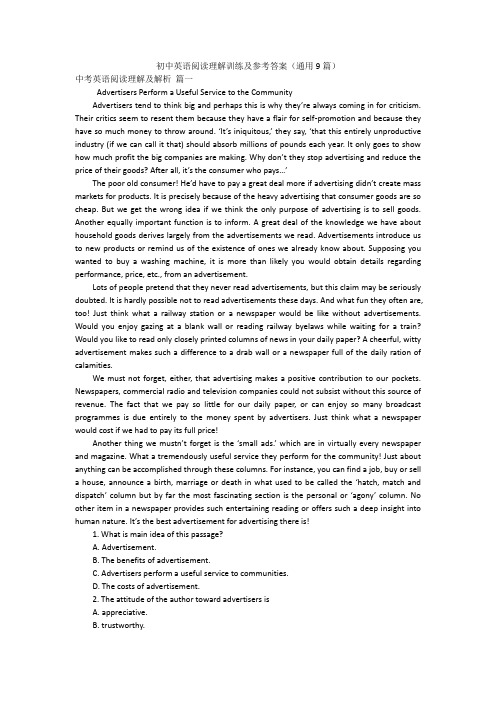
初中英语阅读理解训练及参考答案(通用9篇)中考英语阅读理解及解析篇一Advertisers Perform a Useful Service to the CommunityAdvertisers tend to think big and perhaps this is why they’re always coming in for criticism. Their critics seem to resent them because they have a flair for self-promotion and because they have so much money to throw around. ‘It’s iniquitous,’ they say, ‘that this entirely unproductive industry (if we can call it that) should absorb millions of pounds each year. It only goes to show how much profit the big companies are making. Why don’t they stop advertising and reduce the price of their goods? After all, it’s the consumer who pays…’The poor old consumer! He’d have to pay a great deal more if advertising didn’t create mass markets for products. It is precisely because of the heavy advertising that consumer goods are so cheap. But we get the wrong idea if we think the only purpose of advertising is to sell goods. Another equally important function is to inform. A great deal of the knowledge we have about household goods derives largely from the advertisements we read. Advertisements introduce us to new products or remind us of the existence of ones we already know about. Supposing you wanted to buy a washing machine, it is more than likely you would obtain details regarding performance, price, etc., from an advertisement.Lots of people pretend that they never read advertisements, but this claim may be seriously doubted. It is hardly possible not to read advertisements these days. And what fun they often are, too! Just think what a railway station or a newspaper would be like without advertisements. Would you enjoy gazing at a blank wall or reading railway byelaws while waiting for a train? Would you like to read only closely printed columns of news in your daily paper? A cheerful, witty advertisement makes such a difference to a drab wall or a newspaper full of the daily ration of calamities.We must not forget, either, that advertising makes a positive contribution to our pockets. Newspapers, commercial radio and television companies could not subsist without this source of revenue. The fact that we pay so little for our daily paper, or can enjoy so many broadcast programmes is due entirely to the money spent by advertisers. Just think what a newspaper would cost if we had to pay its full price!Another thing we mustn’t forget is the ‘small ads.’ which are in virtually every newspaper and magazine. What a tremendously useful service they perform for the community! Just about anything can be accomplished through these columns. For instance, you can find a job, buy or sell a house, announce a birth, marriage or death in what used to be called the ‘hatch, match and dispatch’ column but by far the most fascinating section is the personal or ‘agony’ column. No other item in a newspaper provides such entertaining reading or offers such a deep insight into human nature. It’s the best advertisement for advertising there is!1. What is main idea of this passage?A. Advertisement.B. The benefits of advertisement.C. Advertisers perform a useful service to communities.D. The costs of advertisement.2. The attitude of the author toward advertisers isA. appreciative.B. trustworthy.C. critical.D. dissatisfactory.3. Why do the critics criticize advertisers?A. Because advertisers often brag.B. Because critics think advertisement is a “waste of money”。
精选中考阅读理解30篇(附答案)
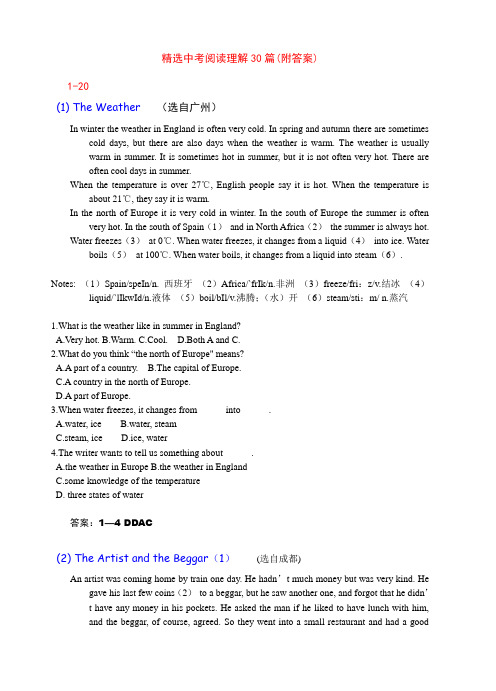
精选中考阅读理解30篇(附答案)1-20(1) The Weather (选自广州)In winter the weather in England is often very cold. In spring and autumn there are sometimes cold days, but there are also days when the weather is warm. The weather is usuallywarm in summer. It is sometimes hot in summer, but it is not often very hot. There areoften cool days in summer.When the temperature is over 27℃, English people say it is hot. When the temperature is about 21℃, they say it is warm.In the north of Europe it is very cold in winter. In the south of Europe the summer is often very hot. In the south of Spain(1)and in North Africa(2)the summer is always hot.Water freezes(3)at 0℃. When water freezes, it changes from a liquid(4)into ice. Water boils(5)at 100℃. When water boils, it changes from a liquid into steam(6).Notes: (1)Spain/speIn/n. 西班牙(2)Africa/`frIk/n.非洲(3)freeze/fri:z/v.结冰(4)liquid/`lIkwId/n.液体(5)boil/bIl/v.沸腾;(水)开(6)steam/sti:m/ n.蒸汽1.What is the weather like in summer in England?A.Very hot.B.Warm.C.Cool.D.Both A and C.2.What do you think “the north of Europe" means?A.A part of a country.B.The capital of Europe.C.A country in the north of Europe.D.A part of Europe.3.When water freezes, it changes from into.A.water, iceB.water, steamC.steam, iceD.ice, water4.The writer wants to tell us something about.A.the weather in EuropeB.the weather in EnglandC.some knowledge of the temperatureD. three states of water答案:1—4 DDAC(2) The Artist and the Beggar(1)(选自成都)An artist was coming home by train one day. He hadn’t much money but was very kind. He gave his last few coins(2)to a beggar, but he saw another one, and forgot that he didn’t have any money in his pockets. He asked the man if he liked to have lunch with him,and the beggar, of course, agreed. So they went into a small restaurant and had a goodmeal.In the end, the artist could not pay the bill(3), and the beggar had to do so. The artist felt very sorry for it, so he said to the beggar, “Come home with me in a taxi, my friend. And I’ll give you the money for our lunch."“Oh, no!" the beggar answered quickly. “I had to pay for your lunch, but I‟m not going to pay for your taxi home!"Notes: (1)beggar/`beg/ n.乞丐(2)coin/kIn/n. 硬币(3)bill /bIl/n.帐单1.What kind of man was the artist?2.What did he do to the first beggar?3.What did the artist forget when he invited another beggar to have lunch with him?4.Who paid for the meal?5.What did the artist want to do at last?6.Why didn’t the beggar go home with the artist?答案:1.The artist is a kind man.2.He gave his last few coins to the first beggar.3.He forgot that he had no money then.4.The beggar paid for the bill.5.He wanted to return the beggar the money when he got home.6.Because he wouldn’t pay for the taxi.(3) A Common Language (选自陇南)There is a common(1)language popular in every country in the world. All the people, old and young, men and women, must use it.It’s everybody’s second language. It’s easy to learn, though(2)you don’t hear it. It’s sign language(3).When you wave to a friend, you are using sign language. When you smile at someone, you mean to be friendly. When you put up your hand in class, you are saying, “Please ask me.I know the correct answer." When you put your finger in front of your mouth, you mean“Be quiet." The deaf use sign language to talk to each other. There is even a universityfor the deaf in the United States. There are also TV programmes for the deaf people.They use sign language to tell everybody.Notes: (1)common/`kmn/adj. 共同的(2)though/u/ conj. 尽管(3)sign language 手势语(4)wave/weIv/ v. 挥手1.E uses sign language.2.Sign language is not d, so we can learn it.3.Most people who can s use sign language, too.4.If someone smiles at you, it means he/she is friendly t you.5.If you can a a question, you should put up your hand first.6.You put your finger in front of your mouth if you want someone not to s anything.7.The deaf can talk to each other w sign language.8.Some A deaf people can learn sign language in the university.答案:1.Everyone 2.difficult 3.speak 4.to 5.answer 6.say 7.with 8.American(4) Tom Broke a Plate or a Gold Watch? (选自辽宁)It was Sunday and Tom was staying at home. After breakfast he went out into the garden and played quietly by himself. There were no kids around and he was used to(1)playing alone quietly. He played with Bobby, the dog. He climbed up and down the tree.Sometimes a bird would come down to perch(2)on top of the doghouse. Then Tom would have the greatest fun(3)by throwing a stone or something at it. Though he never made it, he did like doing this kind of thing.Now Tom had been in the garden for half an hour. Suddenly a crack(4)was heard and the little boy began crying.“What’s the matter,Tom?"his mother looked through the kitchen(5)window. Tom ran into the kitchen.“Mum," he sobbed(6). "I broke Bobby’s plate. I didn’t know it was so fragile(7)."His mother put her arms round him and said, “Don’t feel so sad, Tom. We have other plates for Bobby. But how did you break that one?"“I threw it at a bird but missed, and it went straight to the plate."In Tom’s hand was his father’s gold pocket watch(8)!Notes: (1)be used to 习惯于(2)perch/p:t/n. 停歇(3)fun/fn/n. 爱好(4)crack /crk/n. 破碎声(5)kitchen/`kItn/n. 厨房(6)sob/sb/v. 抽泣(7)fragile/`frdaIl/adj.易碎的(8)gold pocket watch 金怀表1.When did the story happen?A.On a Sunday afternoon.B.On a Sunday morning.C.At noon.D.In the evening.2.When a bird perched on top of the doghouse,Tom.A.would like to play with itB.was very interested in it by throwing a stone at itC.would like to give it something to eatD.would smile3.There were no kids around and he was used to playing alone quietly. Here“kids" means.A.menB.dogsC.childrenD.birds4.How long had Tom been in the garden when his mother heard him cry?A.An hour.B.A day.C.Two hours.D.Half an hour.5.“Though he never made it" means“".A.Though he couldn‟t hit a bird with a stone or somethingB.Though he couldn‟t catch the birdC.Though he couldn‟t have fun from the birdD.Though he couldn‟t eat the bird答案:1—5 BBCDA(5) EatingAn important question about eating out is who pays for the meal. If a friend of yours asks you to have lunch with him, you may say something like this,“I’m afraid it’ll have to be someplace cheap, as I have very little money." The other person may say,“O K, I‟ll meet you at McDonald‟s."This means that the two agree to go Dutch, that is, each person pays for himself. He may also say,“Oh, no. I want to take you to lunch at Smith’s," or“I want you to try the Chinese dumplings there. They’re great." This means the person wants to pay for both of you. If you feel friendly towards this person, you can go with him and you needn‟t pay for themeal. You may just say,“Thank you. That would be very nice."American customs(1)about who pays for dates(2)are much the same as in other parts of the world. In the old days, American women wanted men to pay for all the meals. But,today, a university(3)girl or a woman in business world will usually pay her way during the day. If a man asks her for a dance outside the working hours, it means“Come, as my guest(4).”So as you can see, it is a polite thing to make the question clear at the very beginning.Notes:(1)custom/`kstm/n. 风俗(2)date/deIt/n.约会(3)university/、ju:nI`v:sItI/n.大学(4)guest/gest/n. 客人1.The passage tells us.A.how to eat outB.where to eat outC.what to eat outD.who pays for the meal2.If you have little money,.A.you‟ll have a cheap mealB.you‟ll borrow some from othersC.you‟ll ask your friend to pay for your mealD.you won‟t want your friends to ask you to dinner3.“Go Dutch" in this passage means.A.去饭馆B.就餐C.订餐D.各自付款4.Sometimes your friend takes you to lunch. It means.A.he‟s going to lend some money to youB.he‟s going to pay for your meal, tooC.he‟ll be angry with youD.he can‟t understand you5.In America,some girls and women now.A.ask men to pay for their mealsB.try to pay for the men‟s mealsC.try to pay for their own mealsD.never have anything outside答案:1—5 DADBC阅读理解(6)Most children like watching TV.It’s very interesting.By(1)watching TV they can see and learn a lot and know many things about their country and the world.Of course,they canalso learn over the radio.But they can learn better and more easily with TV.Why?Because they can hear and watch at the same time.But they can‟t see anything over the radio.TV helps to open children’s helps to open their minds(2),too.They learn newer and better ways of doing things.They may find the world is now smaller than before.Many children watch TV only on Saturday or Sunday evening.They are always busy with their lessons.But a few children watch TV every night.They go to bed very late.Theycan’t have a good rest.How about you,my young friends?Notes:(1)by/baI/prep.通过(2)minds/maIndz/n.智力1.A few children go to bed late because they.A.are busy with their lessonsB.do their homeworkC.watch TVD.listen to the radio2.Children can’t see anything.A.in the radioB.on the radioC.on TVD.by watching TV helps to open children’s.A.eyes and mindsB.mindsC.eyes or mindsD.eyes4.children watch TV only on Saturday or Sunday evening.A.A lotB.MuchC. A lot ofD.A little5.Children can study better and more easily with TV because.A.they like to watch TVB.they can hear at the same timeC.they can watch at the same timeD.they can listen to and see something at the same time参考答案:1.C 2.B 3.A 4.C 5.D阅读理解(7)John was ten years old and he was very lazy[1].He had to go to school,of course,but he was bored[2]there and tried to do as little work as possible.His father and mother were bothdoctors and they hoped that he would become one,too,when he grew up.But one day John said to his mother,“When I finish school, I want to become a garbage collector[3].”“A garbage collector?”his mother asked .She was very surprised.“That’s not a pleasant job.Why do you want to become a garbage collector?”“Because then I’d only have to work one day a week,”John answered.“Only one day a week?”his mother said,“What do you mean?”“Well,”John answered,“I know that the ones who come to our house only work on Wednesday,because I only saw them on that day.”Notes:[1]lazy/leIzI/adj.懒的[2]bored/bd/adj.厌烦[3]garbage collector 垃圾工1.John at school.A.didn’t do any workB.did much workC.did very little workD.tried to finish his work2.John’s parents wanted him to become.A.a garbage collectorB.a doctorC.a teacherD.a worker3.John hoped to be a garbage collector because.A.he knew it was an important and necessary jobB.he thought he would work only one day a weekC.he often saw some garbage collectors come to his houseD.the garbage collectors really work only one day a week4.John thought that the garbage collectors only work one day a week because.A.it was a ruleB.some garbage collectors told him soC.his parents told him soD.he saw them work only on Wednesday参考答案:1.C 2.B 3.B 4.D阅读理解(8)Bill and Fred studied at a university and they were friends. They didn’t have much money, so when it was time for their holidays, Fred said, “Let’s take our holidays in a trailer[1], Bill. It’s cheaper than a hotel. I can borrow my father’s trailer.”Fred was very happy. So they got into the trailer and began their holidays. They wanted to get up early the next day to go fishing, but they didn’t have an alarm[1] clock.“That’s all right, Bill," Fred said. “I’ll put these pieces of bread on the roof[3] of the trailer tonight and they’ll wake us up in the morning." Bill was very surprised, but he didn’t say anything.Fred was right. As soon as it began to get light, small birds came down to eat the bread, and their noise on the roof of the trailer woke Bill and Fred up very quickly.Notes:[1]trailer/`treIl/ n. 活动房屋式的拖车[2]alarm/`la:m/ n. 警报alarm clock 闹钟[3]roof/ru:f/ n. 顶;房顶1.Bill and Fred were both university s.2.The two young men decided to go t during their summer holidays.3.The two young men tried to s some money,so they borrowed a trailer.4.The two young men wanted to get up, but they were a to wake up too late the nextmorning.5.Fred had a good i.6.Bill didn’t know w his friend put some bread on the top of the trailer.7.The next morning, the birds found the bread and flew to e it.8.In fact, the b woke the two young men up.9.The birds began to look for f as soon as it got light.10.Fred was very c.参考答案:1.students 2.traveling 3.save 4.afraid 5.idea 6.why 7.eat 8.birds 9.food 10.clever阅读理解(9)Some children think writers are great and they can tell people a lot. So they also wish to be writers some day. They mean that they want to write stories or books which manypersons will read. I would like to remind[1] them that they will need to be good readersand to read a lot in order to[2] be good writers.Nearly all great writers read too long before they started to school, and read for hours and hours every day since they became good readers. Instead of watching TV in the evening,they spend much of their spare[3] time reading books.If you are a good reader, it won’t take you long to do the reading homework your teacher asks you to do. Then you will have time to read other books for fun. Because you read so well, you keep looking for more books to read.While making up your mind[4] to become a good writer, you had better say to yourself,“I must read more and more if I am really to become a good writer."Notes:[1]remind/rI`maInd/v. 提醒[2]in order to 为了[3]spare /spe/adj. 多余的[4]make up one’s mind 下决心1.Some of the children like the g writers.2.The writer told the children to read m before they hope to be writers.3.A lot of writers l a lot from other writers' books and stories.4.For a student, he or she should do the reading homework well f.5.Doing much good reading can h you to be a good writer.参考答案:1.great 2.more 3.learned 4.first 5.help阅读理解(10)Australia is one of the greatest islands in the world.It is a little smaller than China.It is in the south of the earth.So when there is hot summer in our country,it is cold winter inAustralia.Australia is big,but the population[1] has small.The population of Australia is the same as that of Shanghai,a city in China.Australia is famous for its sheep and kangaroos[2].After a short drive from any town,you will find yourself in the middle of white sheep,sheep,sheep,everywhere are sheep.Have youseen a kangaroo?It has a “bag”in its body.The mother kangaroo keeps its babykangaroo in the “bag”.It is very interesting,isn‟t it?Notes:[1]population /、ppjuleIn/n.人口[2]kangaros /、kg`ru:/n.袋鼠根据短文内容判断正(√)、误(×)。
初中现代文阅读理解题精选及答案共16篇解析
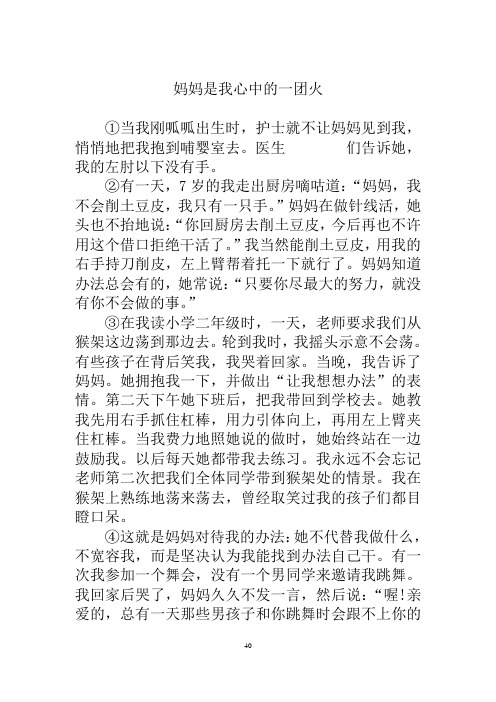
妈妈是我心中的一团火①当我刚呱呱出生时,护士就不让妈妈见到我,悄悄地把我抱到哺婴室去。
医生们告诉她,我的左肘以下没有手。
②有一天,7岁的我走出厨房嘀咕道:“妈妈,我不会削土豆皮,我只有一只手。
”妈妈在做针线活,她头也不抬地说:“你回厨房去削土豆皮,今后再也不许用这个借口拒绝干活了。
”我当然能削土豆皮,用我的右手持刀削皮,左上臂帮着托一下就行了。
妈妈知道办法总会有的,她常说:“只要你尽最大的努力,就没有你不会做的事。
”③在我读小学二年级时,一天,老师要求我们从猴架这边荡到那边去。
轮到我时,我摇头示意不会荡。
有些孩子在背后笑我,我哭着回家。
当晚,我告诉了妈妈。
她拥抱我一下,并做出“让我想想办法”的表情。
第二天下午她下班后,把我带回到学校去。
她教我先用右手抓住杠棒,用力引体向上,再用左上臂夹住杠棒。
当我费力地照她说的做时,她始终站在一边鼓励我。
以后每天她都带我去练习。
我永远不会忘记老师第二次把我们全体同学带到猴架处的情景。
我在猴架上熟练地荡来荡去,曾经取笑过我的孩子们都目瞪口呆。
④这就是妈妈对待我的办法:她不代替我做什么,不宽容我,而是坚决认为我能找到办法自己干。
有一次我参加一个舞会,没有一个男同学来邀请我跳舞。
我回家后哭了,妈妈久久不发一言,然后说:“喔!亲爱的,总有一天那些男孩子和你跳舞时会跟不上你的拍子的,你会看到的。
”她声音虚弱嘶哑,我撕开蒙着头部的被子 kuī见她在流泪。
于是我懂得妈妈为我忍受了多少痛苦。
她从来不让我看到她哭泣,因为她不愿我感到内疚呀。
⑤如今当我有不顺心的事时,总感到妈妈仍在我身旁,仍在对我说:勇敢地面对困难,没有解决不了的事。
1. 根据拼音写出汉字(第④段)。
kuī见2. 在第①段的横线里填上一个意为“温和而曲折地(表达意思)”的词,这个词应是:______3. 比较一下第②段妈妈让“我”削土豆皮的事和第③段妈妈教“我”荡猴架两件事,说说母亲的表现有什么不同?为什么有所不同?4. 当“我”在猴架上熟练地荡来荡去,曾经取笑过我的孩子们都目瞪口呆。
完整版)初中语文阅读理解带答案

完整版)初中语文阅读理解带答案周一记叙文寒冷的北风像篦子一样梳理着裸露的皮肤,英的手背上留下了血口子。
娘曾经告诉她,女孩子能够识几个字就够了,不要太过苛求,但是这句话让英感到非常委屈,她的眼泪夺眶而出。
她经常流泪的地方已经留下了印记,就像两片干枯的柳叶子。
过年时,乡里分发了市里人捐赠的衣物,村里再将它们分发给村民。
听到领取的呼声,英跟着娘一起去领。
村长的家是村里的办公地点,只比英家多了一张床和两把会吱吱作响的白茬椅子。
捐赠物品只剩下一双皮鞋、一件半新不旧的红毛衣和一个塑料文具盒。
村长脸上露出难色,说:“大妹子,挑一样吧,还有两家要分呢。
”娘毫不犹豫地拿起了那件红毛衣,抖了几下之后就往英身上套。
英不得不后退几步,但是她的目光一直盯着那个文具盒。
娘说,那个东西不会御寒啊,你要它干嘛?村长笑着说:“这个闺女有出息啊。
”娘叹了口气,拿着毛衣在手里摆弄,说:“你真是个傻瓜。
”得到这个文具盒后,英把它当作珍宝一样,用布包好,放在枕头边,从不往书包里装。
没人的时候,她就打开它——就像打开了一个天地:文具盒里有花花绿绿的贴画、课程表,还有一支漂亮的自动铅笔……拿起自动铅笔,她就觉得自己也会在市里某个明亮、温暖的教室里……几年以后,英考上了中专,去市里上学。
她出门前没有忘记带上文具盒。
开学的第一天,英把文具盒放在桌子上——这是唯一能和同学们一样的东西了。
同桌的女孩叫丽,家就在市里。
看到那个文具盒,丽不屑地笑了。
当英打开它时,丽的眼睛瞪大了,那个课程表是她设计的……丽说:“你真会爱惜东西啊。
”英笑着说:“有了这个文具盒,我就不会再哭了。
你小时候喜欢哭吗?”丽没有回答,但她的脸变得通红。
她没有说出这个文具盒是为了让妈妈再买一个更好的而捐出的。
当时妈妈说这个文具盒还可以用,但她却闹别扭,还哭了……英和丽成为了好朋友。
在一个周末,丽邀请英去她家玩。
英不想去,因为娘说过不要到别人家去。
丽说:“我妈妈主要是想见见你……”于是英去了。
初中语文现代文阅读训练及答案二十篇

初中语文现代文阅读训练与答案一、寂静除夕夜(1)每当___的鞭炮声四起,绚丽夺目的焰火映亮夜空……我就会___地想起20年前的那个除夕夜。
(2)那是“文革”时期,父亲一夜之间被打成“现行反革命分子”。
(3)消息传来,母亲当即昏厥,待醒来已神志不清,语无伦次。
这____的打击个母亲不知所措,她疯了。
(4)和美之家一下子抽去了两根顶梁柱,剩下的,除了一个年过半百的姥姥,就是我们几个未成年的孩子了。
(5)日子的艰难可想而知。
品学兼优的姐姐含泪放弃了学业——很快在小学当上了民办教师,一天可挣得5分工。
尽管如此,家里依然是吃了上顿没下顿。
更痛苦的是,精神失常的母亲还时不时对这个破败之家来个毁灭性的摧残。
她有个怪癖,平日安安静静不言不语,但只要一看见人流泪或听到鞭炮声(后来由她误会成枪声),便歇斯底里地大哭大闹,摔碗,直至声嘶力竭动弹不得。
(6)因此,姥姥常常嘱咐我们,无论如何不能在母亲面前流泪。
(7)春节临近了,按乡村规矩腊月二十三为小年,早放鞭炮敬拜祖先,而除夕夜吃年夜饭放鞭炮则是永年好运的预兆。
早已被折磨得不成人形的姥姥心力交瘁,万般无奈中将我们姐弟叫到跟前,吩咐道:你们出去给家家户户磕磕头、说说好话看能不能过小年不放鞭炮,三十再放,省得你母亲接二连三的发作,我实在是怕了。
(8)于是,姐姐带着我们出发了。
(9)我们居住的院子前后约有九排七八十户人家。
我们从头一排开始,每到一户姐弟四人便一字儿排开,齐齐下跪,告诉她们母亲的病情,乞求他们少放一次鞭炮。
就这样我们不过走了十多户人家人们便一传十,十传百,再后来家家户户都陆续出来人了。
围拢来的乡亲说什么也不让我们下跪,一位年长的大妈抱起我,含泪道:(10)“苦命的孩子,我们都晓得,不用磕头了,我们不放鞭炮,一个也不放。
”(11)我牢记着姥姥的叮嘱,拼命忍住泪水,然而,我却分明看见,围拢来的乡亲们全都流下泪来……(12)小年就这样平静地过去了。
(13)三十那天,吃过晚饭后,姥姥便领着我们着手准备即将面临的灾难。
初中语文阅读理解练习题及答案
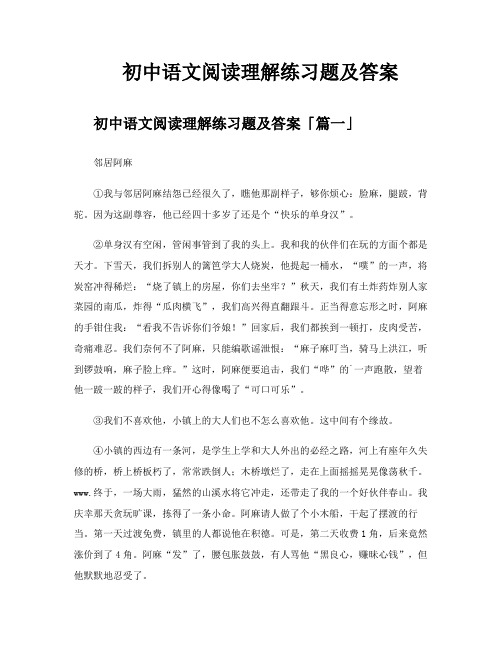
初中语文阅读理解练习题及答案初中语文阅读理解练习题及答案「篇一」邻居阿麻①我与邻居阿麻结怨已经很久了,瞧他那副样子,够你烦心:脸麻,腿跛,背驼。
因为这副尊容,他已经四十多岁了还是个“快乐的单身汉”。
②单身汉有空闲,管闲事管到了我的头上。
我和我的伙伴们在玩的方面个都是天才。
下雪天,我们拆别人的篱笆学大人烧炭,他提起一桶水,“噗”的一声,将炭窑冲得稀烂:“烧了镇上的房屋,你们去坐牢?”秋天,我们有土炸药炸别人家菜园的南瓜,炸得“瓜肉横飞”,我们高兴得直翻跟斗。
正当得意忘形之时,阿麻的手钳住我:“看我不告诉你们爷娘!”回家后,我们都挨到一顿打,皮肉受苦,奇痛难忍。
我们奈何不了阿麻,只能编歌谣泄恨:“麻子麻叮当,骑马上洪江,听到锣鼓响,麻子脸上痒。
”这时,阿麻便要追击,我们“哗”的`一声跑散,望着他一跛一跛的样子,我们开心得像喝了“可口可乐”。
③我们不喜欢他,小镇上的大人们也不怎么喜欢他。
这中间有个缘故。
④小镇的西边有一条河,是学生上学和大人外出的必经之路,河上有座年久失修的桥,桥上桥板朽了,常常跌倒人;木桥墩烂了,走在上面摇摇晃晃像荡秋千。
www.终于,一场大雨,猛然的山溪水将它冲走,还带走了我的一个好伙伴春山。
我庆幸那天贪玩旷课,拣得了一条小命。
阿麻请人做了个小木船,干起了摆渡的行当。
第一天过渡免费,镇里的人都说他在积德。
可是,第二天收费1角,后来竟然涨价到了4角。
阿麻“发”了,腰包胀鼓鼓,有人骂他“黑良心,赚昧心钱”,但他默默地忍受了。
⑤风里来,雨里去。
阿麻摆渡六年,操劳过度,脸色蜡黄,日渐消瘦。
人们担心,他总有一天会栽倒在小河里。
⑥后来,小河上砌起了一座石拱桥,小巧玲珑,像一把小金锁,锁住了放荡不羁的小河。
从此,小镇的人们过河如履平地,都说修桥人泽被后世。
⑦小桥落成的前两天,阿麻死了。
医生说他患的是癌症。
⑧小桥落成那天,正逢小镇赶集,人山人海,好不热闹。
桥上没有彩灯,没有横幅,没有红绸。
一挂20xx响,响过以后,镇长讲话了:“今天,我们在这里举行小桥落成典礼暨阿麻同志追悼会。
初中现代文阅读理解题精选及答案共20篇

初中现代文阅读理解题精选及答案共20篇一、现代文阅读1.阅读文章,回答问题。
童心苹果刘诚龙爱人在一所小学教书,早出晚归,披星戴月。
若时间可以伸缩,她会把在校时光拉长,在家时日压短。
在校,她把“时间”有意无意说成是“时光”;在家,___。
她意识里,___,家里时间是度日如年。
也是也是,在校园,___;到家里,整天所见的是皱皱的核桃脸。
爱人给我泡一碗面,放桌上。
她喝瓶牛奶啥的,提包就去学校。
不饿?不饿,爱人说。
她到学校不缺吃的,早晨,这学生会送她个包子,那学生会送她半边月饼,汉堡包肯德基的,都会有一两个学生从书包里掏出来:艾老师,您吃。
她不想吃,有段日子在减肥,她的减肥要诀是不吃,或是少吃。
一个暑假过去,减肥效果不太理想,却也看得见。
班里学生见了,大喊:老师,您瘦了?我们不准您瘦。
也不知道是从谁开始的,也不知哪天,不经意间,便常有几个学生,书包里带上零食送老师吃。
街上的,家里做的,还有爸妈自远处归来带给孩子吃的。
这天,是个男学生,长得憨头憨脑,圆圆的脸,他妈叫他“足球”。
干吗叫球,叫“苹果”多好。
这孩子脸圆,肚也圆,看那肚子,是个小吃货,容量大,蛮能装东西的。
砰砰砰,他书包都没放课桌就跑老师门前来了:“老师,您吃苹果。
“不用不用,你自己吃。
”“不,老师吃了别个同学的,干吗不吃我的?”“我吃了,你没有吃的啦。
”“我还有。
”他翻了书包,果然里面有个大苹果。
老师笑了,把苹果接了,随手放在桌子上。
“莫放桌子上。
”他拿起苹果放在老师茶杯上。
“‘苹果球’,这星期要奖你一面小红旗噢,好讲卫生。
”老师既不跟他妈叫他“足球”,也不拟他脸型叫他“苹果”,而是综合两者叫他“苹果球”。
“老师,我要看这个苹果生个苹果崽崽出来。
”原来上次带他去了一个蔬菜基地,蔬菜基地搞大棚蔬菜,他一知半解,说给植物根部水,上面给阳光饱暖,菜会生菜,根会生根,苹果下面给了水,会苹果生苹果。
越过窗子,一缕阳光射进窗来,正好打在苹果阳面。
水,阳光,还有那颗心,是会让这个苹果开花吧,结果吧。
初中现代文阅读理解题精选及答案共20篇
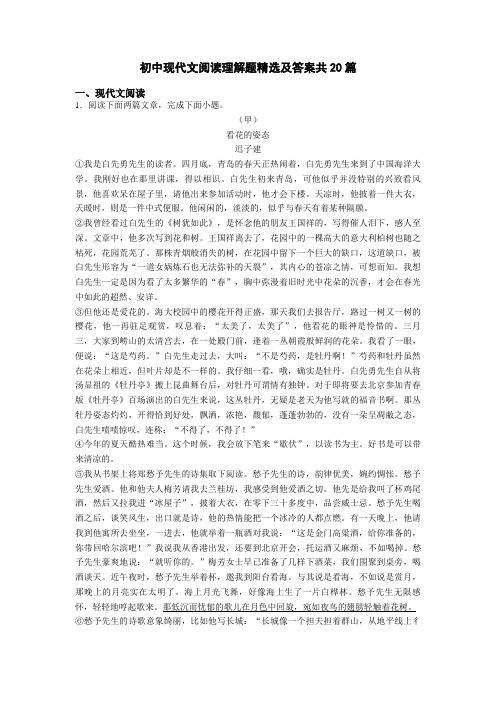
初中现代文阅读理解题精选及答案共20篇一、现代文阅读1.阅读下面两篇文章,完成下面小题。
(甲)看花的姿态迟子建①我是白先勇先生的读者。
四月底,青岛的春天正热闹着,白先勇先生来到了中国海洋大学。
我刚好也在那里讲课,得以相识。
白先生初来青岛,可他似乎并没特别的兴致看风景,他喜欢呆在屋子里,请他出来参加活动时,他才会下楼。
天凉时,他披着一件大衣,天暖时,则是一件中式便服。
他闲闲的,淡淡的,似乎与春天有着某种隔膜。
②我曾经看过白先生的《树犹如此》,是怀念他的朋友王国祥的,写得催人泪下,感人至深。
文章中,他多次写到花和树。
王国祥离去了,花园中的一棵高大的意大利柏树也随之枯死,花园荒芜了。
那株青烟般消失的树,在花园中留下一个巨大的缺口,这道缺口,被白先生形容为“一道女娲炼石也无法弥补的天裂”,其内心的苍凉之情,可想而知。
我想白先生一定是因为看了太多繁华的“春”,胸中弥漫着旧时光中花朵的沉香,才会在春光中如此的超然、安详。
③但他还是爱花的。
海大校园中的樱花开得正盛,那天我们去报告厅,路过一树又一树的樱花,他一再驻足观赏,叹息着:“太美了,太美了”,他看花的眼神是怜惜的。
三月三,大家到崂山的太清宫去,在一处殿门前,逢着一丛朝霞般鲜润的花朵。
我看了一眼,便说:“这是芍药。
”白先生走过去,大叫:“不是芍药,是牡丹啊!”芍药和牡丹虽然在花朵上相近,但叶片却是不一样的。
我仔细一看,哦,确实是牡丹。
白先勇先生自从将汤显祖的《牡丹亭》搬上昆曲舞台后,对牡丹可谓情有独钟。
对于即将要去北京参加青春版《牡丹亭》百场演出的白先生来说,这丛牡丹,无疑是老天为他写就的福音书啊。
那丛牡丹姿态灼灼,开得恰到好处,飘洒,浓艳,馥郁,蓬蓬勃勃的,没有一朵呈凋敝之态,白先生啧啧惊叹,连称:“不得了,不得了!”④今年的夏天酷热难当。
这个时候,我会放下笔来“歇伏”,以读书为主。
好书是可以带来清凉的。
⑤我从书架上将郑愁予先生的诗集取下阅读。
愁予先生的诗,韵律优美,婉约惆怅。
- 1、下载文档前请自行甄别文档内容的完整性,平台不提供额外的编辑、内容补充、找答案等附加服务。
- 2、"仅部分预览"的文档,不可在线预览部分如存在完整性等问题,可反馈申请退款(可完整预览的文档不适用该条件!)。
- 3、如文档侵犯您的权益,请联系客服反馈,我们会尽快为您处理(人工客服工作时间:9:00-18:30)。
(一) A Trip to the Forest One day Bob took two of his friends in-to the mountains. They put up their tents (帐篷) and then rode off to a forest to see how the trees were growing. In the afternoon when they were about ten kilometres from their camp(营地), it start-ed to snow. More and more snow fell. Soon Bob could hardly see his hands before his face. He could not find the road. Bob knew there were two roads. One road went to the camp, and the other went to his house. But all was white snow. Everything was the same. How could he take his friends back to the camp? Bob had an idea. The horses! Let the horses take them back! But what would hap-pen if the horses took the road to his house? That would be a trip of thirty-five kilometres in such cold weather! It was getting late. They rode on and on. At last the horses stopped. Where were they? None of them could tell. John looked around. What was that under the tree? It was one of their tents! 1. John and his two friends went to the forest to ____. A. build their camp B. find their way home C. enjoy the mountains in the snow D. watch the trees in the forest 2. They could not find their way back be-cause ____.A. there was only one road to their campB. they couldn't decide which of the two roads led to their tentsC. there were no roads in the mountains at allD. everything was covered by the white snow 3. It is clear that they wanted the horses to take them to ____.A. John's houseB. the campC. the forestD. the mountains 4. The horses stopped because____. A. it was getting late B. they were tired after running for a long way C. they knew that they had got to the camp D. they had seen John's house 5. The story happened ____. A. on a cold winter day B. on a dark snowy evening C. in a cold camp far from villages D. at night when nothing could be seen [Key] 1. D 2.D 3. B 4. C 5. A (二) The Water World Swimming Pool is open every day from eight o’clock in the morning until half past seven in the evening. It costs two dollars sixty to enter the pool. There is a special cheap price for students with a student card. The price is one dollar forty. But you must bring your student card with you. On Wednesday morning the pool is only open to mothers and babies. So mothers can enjoy themselves in the water with their babies. Please leave your older children at home on Wednesday morning. The new Water World Caféwill be open up on June 22nd. From the caféyou can watch the swimmers or enjoy a drink after you swim. Please call 2105369 for more information. We look forward to seeing you at the Water World Swimming Pool. 1. How long is the Water World Swimming Pool open every day? A. Eleven hours. B. Seven hours. C. Eleven and a half hours. D. Seven and a half hours. 2. What is the price for students with a student card to enter the pool?A. Two dollars.B. One dollar forty.C. Two dollars sixty.D. One dollar. 3. A ten-year-old boy can’t go to the Water World Swimming Pool . A. on Saturday B. on Sunday C. on Wednesday afternoon D. on Wednesday morning 4. From the caféyou can watch the swimmers or enjoy a drink after you swim ___________. A. on May 21st B. on May 22nd C. on June 23rd D. on June 21st 5. This passage is a(n) ___________. A. advertisement B. note C. story D. slogan 1-5 CBDCA阅读理解【1】In most parts of the world, many students help their schools make less pollution. They join“environment club”. In an environment club, people work together to make our environment clean. Here are some things students often do. No-garbage(无垃圾)lunches. How much do you throw away after lunch? Environment clubs ask students to bring their lunches in bags that can be used again. Every week they will select the class that makes the least garbageand commend(表扬)it to the whole school! No-car day. On a no-car day, nobody comes to school in a car—neither the students nor the teachers! Cars give pollution to our air, so remember: Walk, jump, bike or run. Use your legs! It’s lots of fun! Turn off the water! Do you know that toilets can waste twenty to forty tons of water an hour? In a year, that would fill a small river! In environment clubs, students mend those broken toilets. We love our environment. Let’s work together to make it clean. 51. Environment clubs ask students ______________. A. to run to school every day B. to take exercise every day C. not to forget to take cars D. not to throw away lunch bags 52. From the passage we know the students usually have lunch ___________. A. at school B. in shops C. in clubs D. at home 53. On a no-car day, ________________ will take a car to school. A. both students and teachers B. only students C. neither students nor teachers D. only teachers 54. After students mend toilets, they save _____________. A. a small river B. a club C. a lot of water D. a toilet 55. The writer wrote the passage to ask students to __________. A. clean school B. make less pollution C. join clubs D. help teachers 参考答案: CDCDA 阅读理解【2】Sarah left school at eighteen, went to collage and then worked at a computer company. Four years later, she got a new job as a manager in British Airways(英国航空公司). This is what she told us about her job: “My office is at Heathrow Airport, but I spend 60% of my time in the air. I teach air-hostesses(空姐)and help them with any problems. I also go to lots of meetings. My hours are usually form 8 a.m. to 4 p.m. but sometimes I work from 1 p.m. to 9 p.m. At work, the first thing I do is check plane times on my computer and then I speak with some of the air-hostesses. Sometimes I go on long flights(飞行)to check how the air-hostesses are doing. That’s my favourite part of the job, but I like office work, too. Travelling can be hard work. When I get back from a long trip, all I can do is eat something and then go to bed! I don’t make much money, but I’m happy with British Airways and want to stay there and contiue to travel.”66.Sarah’s first job was . A.at a college B.at a computer company C.in British Airways D.at Heathrow Airport 67.Sarah does most of her work . A.in meetings B.in the computer room C.in the office D.in airplanes 68.Most days, Sarah starts work at . A.8 a.m. B.1 p.m. C.4 p.m. D.9 p.m. 69.The first thing Sarah does after a long trip is . A.go to bed B.have a meal C.go to a meeting D.go to the office 70.Sarah would like to . A.make more money B.stop traveling C.go to college again D.stay in the same job 参考答案:66-70. BDABD 阅读理解【3】Do you know who invented tea? In fact, tea, the most popular drink in the world (after water), was invented by accident. According to an ancient Chinese legend, the emperor Shen Nong 46 tea when he was boiling drinking water over an open fire. Some leaves from a nearby bush fell into the water and remained there for 47 . The emperor noticed that the leaves in the water produced a 48 smell. Later he decided 49 the hot mixture. It was quite delicious. And 50 , one of the world’s favorite drinks was invented. China is the home of tea, 51 has more than 4,000 years’history. People throughout China drink tea daily. 52 the three major drinks –tea, coffee and cocoa, tea is drunk by 53 people in the world. Tea from China, along 54 silk and porcelain, began to be known by the world over a thousand years ago and has been an important Chinese export 55 . Tea leaves 56 mainly in the area of south of the Yangtze River, in the provinces of Zhejiang, Jiangxi and Fujian, because of the mild 57 and rich soil there. Longjing, Wulong, Pu’er and Tieguanyin are all 58 kinds of tea. Over the past centuries, Chinese people 59 their unique tea culture, which includes tea planting, tea-leaf picking, tea making and so on. Tea is 60 a popular topic which is often mentioned in dances, songs, poems and novel. 46. A. invented B. found out C. discovered D. tried out 47. A. sometimes B. sometime C. some times D. some days 48. A. pleasant B. pleased C. bad D. terrible 49. A. not to taste B. to taste C. tasting D. taste 50. A. by the way B. on the way C. on its way D. in this way 51. A. who B. which C. where D. when 52. A. In B. For C. Of D. By 53. A. the number of B. a number of C. a large number of D. the largest number of 54. A. between B. with C. except D. besides 55. A. at that time B. from now on C. since then D. since now 56. A. produce B. are produced C. make D. are made 57. A. climate B. weather C. condition D. enviroment 58. A. interesting B. important C. famous D. normal 59. A. had developed B. have developed C. developed D. are developing 60. A. too B. as well C. either D. also 参考答案: CBABD 51-55. BCDBC 56-60. BACBD。
